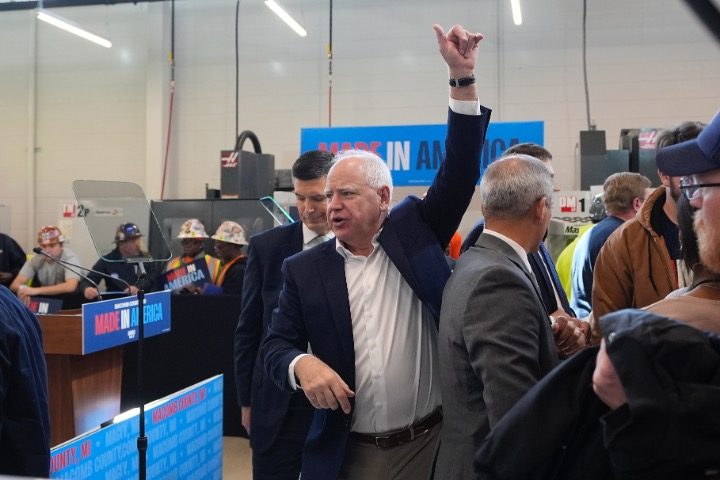
Tim Walz, the Democratic Party’s nominee for vice president of the United States and current governor of Minnesota, faces yet another integrity issue. As chairman of Minnesota’s $146 billion State Retirement System (which includes plans of the State Board of Investment [SBI] and the Minnesota Teacher Retirement Association [TRA]), he has worked mightily to keep an investigator from gaining access to critical information needed to complete his examination of those funds.
So ripe unto rotten is the odious misbehavior of Walz and his subordinates that a group of teachers created a GoFundMe page to pay for the services of Edward “Ted” Siedle to find out just how deep and wide the corruption in Minnesota really is. They raised $75,000 in 19 days, and Siedle got to work.
For the record, Siedle is one of the most effective investigators of pension plan fraud in the country. The author (along with Robert Kiyosaki) of Who Stole My Pension?, Siedle was instrumental in securing two of the largest whistleblower awards in history: $30 million and $48 million as part of a $367 million JPMorgan Chase settlement. The bank was charged with failing to disclose certain conflicts of interest to some of its wealth-management clients.
Stonewalling
From the beginning, says Siedle, he was stonewalled at every turn. He wrote:
Transparency … could … swiftly cure all that ails both pension [plans] — highly suspect performance claims; massive undisclosed, excessive and potentially bogus investment fees and expenses; reckless risk-taking; unaddressed conflicts of interest, [and] mismanagement and potential malfeasance.
Siedle sought the information he needed through public information requests of both the TRA and the SBI. He was told the information didn’t exist. Then he was told that the information was being deliberately withheld from the board members charged with overseeing the management of the funds because it was deemed irrelevant — the board should focus on overall returns and not on any excessive fees or self-dealing that might be involved in obtaining those returns.
He noted:
Our investigation reveals TRA and SBI have long abandoned transparency choosing instead to collaborate with politicians, public pension industry insiders and Wall Street to eviscerate Minnesota public records laws and avoid accountability to stakeholders.
Predictably, tens of billions that could have been used to pay state retirement benefits have been squandered as transparency has ceased to be a priority.
The stonewalling effectively kept Siedle at bay. He wrote:
In conclusion, TRA claims it has no data to disclose regarding its investments and SBI has chosen to simply not respond to [my] repeated requests for such data. Whether SBI even has the data requested is unknown. [Emphasis in original.]
Of note, Siedle testified in the trial of Bernie Madoff, who was convicted of similar crimes. Madoff kept everyone in the dark to keep his Ponzi scheme alive for decades before he was found out. So it is in Minnesota under the Walz administration.
As Siedle began to dig for information, he learned that panic among the miscreants had set in. SBI Chief Information Officer Jill Schurtz, on six separate occasions, attempted to thwart the efforts of the teachers to fund Siedle’s investigation. During meetings and phone calls,
Schurtz asked the Group [of teachers] to drop their public records request multiple times, and stated that they “didn’t want their name associated with the investigator who took a ‘scorched Earth’ approach in investigating wrongdoing.”
What Did Officials Know?
If they were honorable and had nothing to hide, officials would have, and should have, welcomed Siedle’s investigation. But no. Asked Siedle:
Why did Minnesota government officials immediately assume an independent expert would uncover anything seriously wrong, e.g., mismanagement or wrongdoing? What did they know about the state’s pensions that so worried them [that] they were compelled to preemptively strike out?
Some of the information was available publicly. It has been widely reported that the plans are grossly underfunded — to the tune of about $40 billion. In just the last year, the funded ratio of the TRA dropped precipitously, from a weak 82 percent to a disastrous 76.9 percent.
Siedle smelled a rat. When performance was reported, it was “net of fees,” so that the real costs of managing, running, and investing the funds’ assets were hidden from view. He explained:
The only reason to report total returns on a net of fees basis only is to conceal the total fee amounts — fees which have skyrocketed in recent years.
He also uncovered a strange warning in SBI’s Annual Reports. (These are available to the plans’ participants, and therefore available to Siedle.):
SBI’s Annual Reports include an unusual, prominent warning which indicates the pension has chosen to withhold important fee information from its Board because the pension mistakenly believes the Board should “focus” exclusively on net results, i.e., disclosure of investment fees and expenses would be a mere distraction.
As a result of its “focus,” apparently the SBI Board is unaware of the total amounts paid.
Hidden Fees
Because at least a quarter of the funds of the pension plans are invested in hedge funds, private equity investments, and venture capital funds, the fees are as enormous as they are opaque. Half of those funds charged unjustified fees and expenses without notifying their investors, according to a recent review of them by the Securities and Exchange Commission (SEC).
Siedle made some estimates:
For example, in 2023, TRA disclosed total investment fees of merely $24 million.
We estimate total fees related to TRA’s private equity funds alone that year ranged from $334 million to $467 million.
The undisclosed private investment fees in 2023 alone — in a single year — substantially exceed all fees disclosed by the Fund since 2013 ($262 million).…
Over the past decades, we estimate tens of billions in undisclosed investment fees have been paid by TRA and SBI to Wall Street.
In our opinion, it is inconceivable, given public attention regarding the inadequacy of public pension investment fee disclosures and the numerous costly experts TRA and SBI have retained to advise them, the pensions are unaware of the massive fees they have failed to disclose in the past — even if they are clueless as to the exact amounts.
He concluded:
In light of the serious ongoing concerns identified, it is generally advisable for stakeholders to contact the State Auditor, Legislative Auditor and Attorney General.
However, in this matter, all three of these state offices are potentially conflicted.
Because of that conclusion, Siedle filed his report with the SEC and the FBI. He’s hoping against hope that they too aren’t “potentially conflicted,” and will actually do something about his revelations.
It should be remembered that Governor Walz was once a teacher himself. According to Siedle, though, he has “not shown any support whatsoever” for the teachers’ pleas for more transparency.
It’s also worth noting that the rats are already leaving the sinking ship. Jay Stoffel, the executive director of the TRA, appointed by Walz to that position, suddenly announced his retirement at a June board meeting, just moments after his fellow board members had reappointed him to serve another term.




